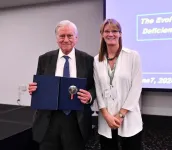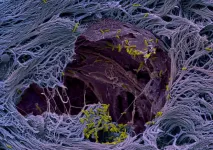New York, NY [June 10, 2024]—Researchers at the Icahn School of Medicine at Mount Sinai have been awarded a $21 million grant from the National Institute on Aging (NIA) of the National Institutes of Health (NIH), to further advance understanding of an aging-related hormone known as follicle-stimulating hormone (FSH), including its potential role in obesity, osteoporosis, and Alzheimer’s disease. The work could lead to the development of new treatments for these and other conditions involving aging.
This is a collaborative effort with the NIA, led by Mone Zaidi, MD, PhD, Director of the Center for Translational Medicine and Pharmacology at Icahn Mount Sinai, and Clifford J. Rosen, MD, at the MaineHealth Institute for Research in Scarborough, Maine. Dr. Zaidi and Dr. Rosen are Program Directors, and principal investigators of individual projects are Anne Schafer, MD, at the University of California in San Francisco, as well as scientists at Icahn Mount Sinai, including Tony Yuen, PhD, Associate Professor and Research Director of the Center for Translational Medicine and Pharmacology, and Daria Lizneva, MD, PhD, Associate Professor of Pharmacological Sciences. Together, the investigators will work toward translating their findings into viable treatments for patients.
"We are delighted that the NIH has recognized the potential of our work by awarding this generous grant," says Dr. Zaidi, the Mount Sinai Professor of Clinical Medicine at Icahn Mount Sinai. "Our focus for more than 25 years has been on identifying actionable targets for major public health diseases. This research offers the potential for a new drug for menopause and could also possibly help advance treatments for Alzheimer’s disease, obesity, and osteoporosis, affecting millions of people worldwide.”
Over the past 25 years, Dr. Zaidi’s work has led to seminal papers, including publications in Nature in 2017 and 2022. In these studies, he demonstrated that inhibiting FSH increases bone mass and reduces body fat and neurodegeneration, providing a vital basis for creating a single anti-FSH agent that could potentially treat these conditions.
In 2017, Nature Medicine selected Dr. Zaidi's work on FSH and body fat as one of the eight “Notable Advances” in biomedicine. With more than 450 publications in prestigious journals, Dr. Zaidi’s research has received continuous funding from the NIH.
“The work of Dr. Zaidi and collaborators has the potential to transform our understanding of aging-related hormones, with significant implications for global health. Their contributions could pave the way for new treatments and interventions that improve the quality of life for older adults worldwide,” says Eric J. Nestler, MD, PhD, the Nash Family Professor of Neuroscience, Director of The Friedman Brain Institute, Dean for Academic Affairs at Icahn Mount Sinai, and Chief Scientific Officer of the Mount Sinai Health System. “We are grateful to the NIH for their support to further advance this critical research.”
The NIH grant (U19 AG060917), titled “FSH—An Aging Hormone?”, will provide a total of $21 million over the next five years, with an annual funding of $4.2 million.
-####-
About the Icahn School of Medicine at Mount Sinai
The Icahn School of Medicine at Mount Sinai is internationally renowned for its outstanding research, educational, and clinical care programs. It is the sole academic partner for the eight- member hospitals* of the Mount Sinai Health System, one of the largest academic health systems in the United States, providing care to a large and diverse patient population.
Ranked 13th nationwide in National Institutes of Health (NIH) funding and among the 99th percentile in research dollars per investigator according to the Association of American Medical Colleges, Icahn Mount Sinai has a talented, productive, and successful faculty. More than 3,000 full-time scientists, educators, and clinicians work within and across 44 academic departments and 36 multidisciplinary institutes, a structure that facilitates tremendous collaboration and synergy. Our emphasis on translational research and therapeutics is evident in such diverse areas as genomics/big data, virology, neuroscience, cardiology, geriatrics, as well as gastrointestinal and liver diseases.
Icahn Mount Sinai offers highly competitive MD, PhD, and Master’s degree programs, with current enrollment of approximately 1,300 students. It has the largest graduate medical education program in the country, with more than 2,000 clinical residents and fellows training throughout the Health System. In addition, more than 550 postdoctoral research fellows are in training within the Health System.
A culture of innovation and discovery permeates every Icahn Mount Sinai program. Mount Sinai’s technology transfer office, one of the largest in the country, partners with faculty and trainees to pursue optimal commercialization of intellectual property to ensure that Mount Sinai discoveries and innovations translate into healthcare products and services that benefit the public.
Icahn Mount Sinai’s commitment to breakthrough science and clinical care is enhanced by academic affiliations that supplement and complement the School’s programs.
Through the Mount Sinai Innovation Partners (MSIP), the Health System facilitates the real-world application and commercialization of medical breakthroughs made at Mount Sinai. Additionally, MSIP develops research partnerships with industry leaders such as Merck & Co., AstraZeneca, Novo Nordisk, and others.
The Icahn School of Medicine at Mount Sinai is located in New York City on the border between the Upper East Side and East Harlem, and classroom teaching takes place on a campus facing Central Park. Icahn Mount Sinai’s location offers many opportunities to interact with and care for diverse communities. Learning extends well beyond the borders of our physical campus, to the eight hospitals of the Mount Sinai Health System, our academic affiliates, and globally.
-------------------------------------------------------
* Mount Sinai Health System member hospitals: The Mount Sinai Hospital; Mount Sinai Beth Israel; Mount Sinai Brooklyn; Mount Sinai Morningside; Mount Sinai Queens; Mount Sinai South Nassau; Mount Sinai West; and New York Eye and Ear Infirmary of Mount Sinai.
END




